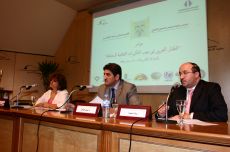The "Arab Child Subject to Different Cultural Influences" conference closes
Posted on
Alexandria, 28 September 2005—Tuesday, 27 September, witnessed the closing of the Arab Child Subject to Different Cultural Influences conference that was held at the Bibliotheca Alexandrina (BA), 25-27 September 2005, under the auspices of HRH Prince Talal Bin Abdel Aziz, President of the Arab Council for Childhood and Development (ACCD).
Within the conference, experts in children’s education discussed over thirty research topics revolving around the different sources of the Arab child’s culture; the positive and negative effects of globalization on the Arab child’s language; the impact of local and foreign media on his/her identity; and how the Arab child expresses himself/herself.
The recommendations included the following: promoting the use of the child’s mother language, providing appropriate media for all age groups, as well as considering aesthetic and creative criteria in children’s publications and education. In addition, they appealed to intellectuals to encourage dialogue and tolerance by children, their openness to the other and participation in public affairs. The employment of new technologies to develop the skills and culture of children with special needs was called for, and the integration of these children in all activities and programs.
Moreover, the continuous training of those working with children was stressed, and the creation of an electronic network between associations and institutions concerned with children for the exchange of expertise, knowledge and the documentation of related works. The importance of promoting the value of reading and the provision of public libraries for children was also emphasized, as well as Arab cooperation and investment in quality entertainment for children.
During the closing session, merit plaques were handed to those who contributed to the conference’s success; including the BA, the Regional Office of UNICEF in Amman and the Supreme Council for Family Affairs in Sharjah.
The three days of the conference included workshops and sessions emphasizing Arab children’s rights and how to meet their educational needs, reinforce their identity, culture and language.
 |
 |
| Closing Session speakers |
Closing Session attendance |